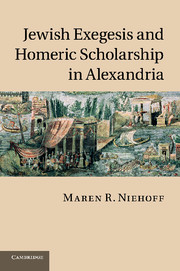Book contents
- Frontmatter
- Contents
- Acknowledgements
- List of abbreviations
- 1 Setting the stage
- Part I Early Jewish responses to Homeric scholarship
- Part II Critical Homeric scholarship in the fragments of Philo's anonymous colleagues
- 5 Comparative mythology
- 6 Historical perspectives on Scripture
- 7 Traces of text criticism among Alexandrian Jews
- Part III The inversion of Homeric scholarship by Philo
- Epilogue
- References
- Index of Greek terms
- Index of sources
- Index of modern authors
- General index
7 - Traces of text criticism among Alexandrian Jews
Published online by Cambridge University Press: 03 May 2011
- Frontmatter
- Contents
- Acknowledgements
- List of abbreviations
- 1 Setting the stage
- Part I Early Jewish responses to Homeric scholarship
- Part II Critical Homeric scholarship in the fragments of Philo's anonymous colleagues
- 5 Comparative mythology
- 6 Historical perspectives on Scripture
- 7 Traces of text criticism among Alexandrian Jews
- Part III The inversion of Homeric scholarship by Philo
- Epilogue
- References
- Index of Greek terms
- Index of sources
- Index of modern authors
- General index
Summary
In this last chapter on Philo's anonymous colleagues we shall focus on diverse snippets of evidence rather than on one extended fragment. Throughout his different writings Philo refers to interpretations of Scripture which touch upon issues of text-critical work. The question thus arises whether some of the Alexandrian Bible exegetes not only were familiar with text-critical methods of Homeric scholarship but also applied them to the Jewish Scriptures. If this is indeed the case, as I shall argue, some Alexandrian Jews took the last step of integrating their foundational text into the contemporary, scholarly discourse on foundational literature.
There can be no doubt about the actual familiarity of some Alexandrian Jews with text-critical methods. Aristobulus in the second century bce had already employed them with regard to a pagan text. Quoting a passage from Aratos, he said ‘we have marked [this], removing the divine names Δίς and Ζεύς throughout the verses’. Aristobulus has thus identified an interpolation in a pagan text, which, he was convinced, originally referred to the God of the Jews. He marked the problematic words (σεσημάγκαμεν) and removed (περιαιροῦντες) the names of the pagan deities, writing theos in their place.
Both the method of text emendation and the specific Greek terms employed by Aristobulus belong to the world of Homeric scholarship in Alexandria. Beginning with Zenodotus, the first librarian, and reaching a climax with Aristarchus in the mid second century bce, Alexandrian scholars regularly identified corruptions in the epic text and marked them in the margins of their manuscript.
- Type
- Chapter
- Information
- Jewish Exegesis and Homeric Scholarship in Alexandria , pp. 112 - 130Publisher: Cambridge University PressPrint publication year: 2011



